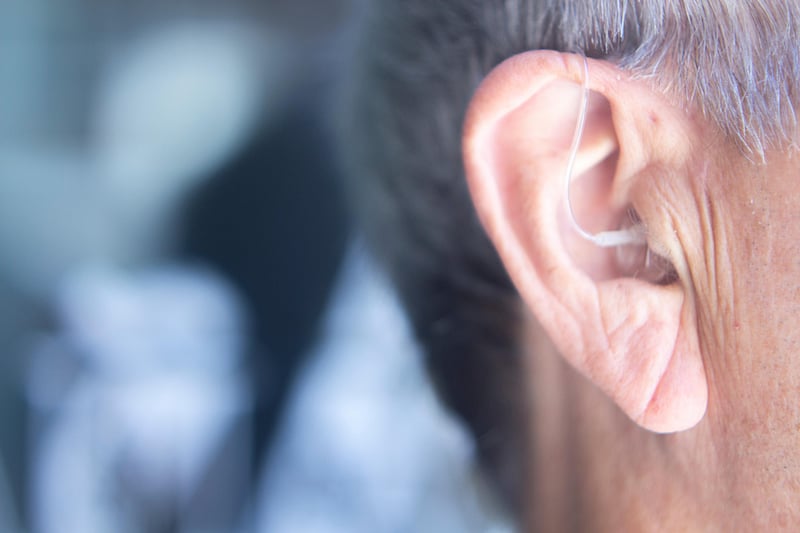Get Healthy!

- Denise Mann
- Posted January 17, 2023
Could Hearing Aids Lower Your Odds for Dementia?
Could losing your hearing as you age be a harbinger of dementia?
Maybe, suggests new research that found that older people who had trouble hearing were more likely to develop dementia down the road. But there's good news with the bad: Hearing aids -- which are now available over-the-counter at much lower prices -- may reduce this risk.
"There is evidence that hearing loss causes structural brain changes,"said study author Nicholas Reed, an audiologist at the Cochlear Center for Hearing and Public Health at Johns Hopkins Medicine, in Baltimore. "You are not getting input to keep your brain robust, so you may develop atrophy in areas, leading to dementia."
In addition, the constant struggle to hear can make your brain work even harder, causing fatigue and laying groundwork for trouble with thinking and memory, he said.
Another potential link? People with hearing loss may withdraw from social events, and staying engaged in the world is known to help stave off dementia, Reed added.
The findings matter to millions: Close to one in three Americans aged 65 to 74 and half of those who are older have hearing loss that is severe enough to affect their quality of life, according to the U.S. National Institute on Deafness and Other Communication Disorders. Yet, the majority of these folks don't use hearing aids.
In this study of more than 2,400 seniors, half of whom were over 80, there was a clear link between hearing loss severity and dementia. Specifically, people with moderate-to-severe hearing loss had a 61% higher risk of developing dementia than those with normal hearing. However, hearing aid use mitigated this risk. People with moderate-to-severe hearing loss who used hearing aids to amplify sound had a 32% lower risk for dementia than their peers who didn't use a hearing aid.
While earlier studies have shown similar links, the new study included a nationally representative sample of people, including the oldest old and Black Americans, suggesting that the findings are generalizable, Reed said.
Still, more research is needed to draw any firm conclusions, he said. Reed and his colleagues are now conducting a three-year trial that should answer any remaining questions about hearing loss, its link to dementia and the potential role that hearing aids can play.
There's lots older people can do today to stave off dementia and improve their hearing, Reed advised.
"Staying socially engaged and active is super important. On the hearing side, let's make the assumption that hearing aids are protective,"he said. "We know they improve quality of life, so addressing hearing loss is worthwhile as you age."
Luckily, addressing hearing loss recently got a lot cheaper: As of August 2022, hearing aids are now available over-the-counter for people with mild and moderate hearing loss, which is the vast majority of age-related hearing loss, he said.
"This is the biggest change in the hearing care field in decades,"Reed noted.
The findings were published Jan. 10 in the Journal of the American Medical Association.
Some people with advanced hearing loss can benefit from a cochlear implant instead of hearing aids, said Dr. J. Thomas Roland Jr., chair of the department of otolaryngology"”head and neck surgery at NYU Langone Health in New York City.
"We can rehabilitate hearing loss with a cochlear implant, and this may stave off dementia by a couple of years,"said Roland, who had no ties to the new study.
"Hearing aids amplify sound, but past a certain point of hearing loss, volume doesn't help,"he explained. This is where cochlear implants come in. These devices bypass damaged portions of the ear and directly stimulate the auditory nerve, said Roland, who just placed a cochlear implant in a 93-year-old.
If you have trouble hearing in noisy backgrounds or on the phone, get tested to see if you would benefit from hearing aids or a cochlear implant, Roland suggested.
"You don't hear well, so you shy away from social events such as going to restaurants, movies, theaters or family events," he said.
Don't wait too long, as it can become a slippery slope, he noted.
More information
Learn more about hearing aids at the U.S. National Institute on Deafness and Other Communication Disorders.
SOURCES: Nicholas Reed, audiologist, Cochlear Center for Hearing and Public Health, Johns Hopkins Medicine, Baltimore; J. Thomas Roland, Jr., MD, chair, department of otolaryngology"”head and neck surgery, NYU Langone Health, New York City; Journal of the American Medical Association, Jan. 10, 2023







